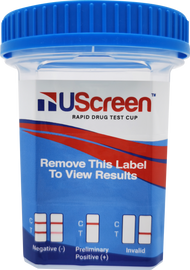UScreen® 14 Panel Drug Test Cup with Adulterants, FDA OTC, CLIA Waived, 4-Sided, 25/Box
Brand : UScreen®
- SKU:
- USSCUPA-14CLIA
UScreen® Rapid Drug Test Cup, 14 Panel, CLIA Waived, OTC, 25/Box
Short-Dated Product - Expiration 4/29/26 - Price Reflects Discount
![]() UScreen FDA Approved Shelf Life Extension Letter
UScreen FDA Approved Shelf Life Extension Letter
The UScreen instant drug test cup is used for the qualitative detection of multiple drugs in human urine at specified cut-off levels. UScreen Drugs of Abuse Cup is a competitive immunoassay that is used to screen for the presence of various drugs in urine. This test will give you peace of mind in 5 easy steps and has a temperature strip located on the back of the UScreen drug test for specimen integrity.
UScreen® Features & Benefits
- CLIA Waived
- OTC - Over-the-Counter FDA Approved
- At Home Use Approved
- Easy one-step operation
- NEW Click Seal Cap
- Colored Adulteration Chart Included
- Zero exposure to donor specimen
- Donor friendly cup opening
- Built-in specimen validity test
- Fast Dark Test Lines
- Most results within 60-90 seconds!
- Temperature Strip for Easy Validation of Specimen's Temperature
- Non Negative results in 5 mins (Results Remain Stable for 60 Minutes)
- Built in Adulteration Test
- Highly Accurate and Reliable
- Disposable Gloves Included per Box
- Security Seals Included
| Fourteen Panel Cup | |||
| Item Number | Panel Configuration | Adulterants Tested (SVT) | Government / Regulatory Approvals |
| USSCUPA-14CLIA | AMP1000, BAR300, BUP10, BZO300, COC300, MDMA500, mAMP/MET1000, MTD300, OPI300, OXY100, PCP25, PPX300 TCA1000, THC50 | CR -Creatinine SG - Specific Gravity PH - pH Level NI - Nitrite GL - Glutaraldehyde |
CLIA Waived OTC - Over the Counter FDA 510(k) Approved |
USCREEN® 14-PANEL DRUG TESTS ARE ACCURATE AND EASY TO USE
- Collect urine specimen, tighten lid.
- Verify temperature is within acceptable range (90-100°)
- Remove label and read results. Wait 5 minutes to determine a positive result.
READING 14-PANEL USCREEN® DRUG TEST RESULTS

ADULTERATION CONTROL
Expected Results:
Creatinine (CRE): Daily creatinine excretion, related to muscle mass of the human body, is usually constant. The DOT guideline states that urine specimens with creatinine levels of less than 20 mg/dl are indications of adulteration. Although these ranges are affected by age, sex, diet, muscle mass and local population distribution2, sample with creatinine level of lower than 20 mg/dl should be considered adulterated.
Glutaraldehyde (GLU): Glutaraldehyde is not a natural component of human urine and it should not be present in normal urine. The presence of glutaraldehyde in the urine sample indicates the possibility of adulteration. However, false positive may result when ketone bodies are presence in urine. Ketone bodies may appear in urine when a person is in ketoacidosis, starvation or other metabolic abnormalities.
Nitrite (NIT): Although nitrite is not a normal component of urine, nitrite levels of up to 3.6 mg/dl may be found in some urine specimens due to urinary tract infections, bacterial contamination or improper storage. In this adulteration control, nitrite level above 7.5 mg/dl is considered abnormal.
pH: Normal urine pH ranges from 4.5 to 8.0. Values below pH 4.0 or above pH 9.0 are indicative of adulteration.
Specific Gravity (S.G.): Random urine may vary in specific gravity from 1.003 - 1.030. Normal adults with normal diets and normal fluid intake will have an average urine specific gravity of 1.016 - 1.022. Elevated urine specific gravity value may be obtained in the presence of moderate quantities of protein. DOT guidelines state that a urine specimen with specific gravity level of less than 1.003 is an indication of adulteration. Specific gravity and creatinine values should be considered together to provide a better picture of whether the sample is adulterated.
Oxidants (OXI): The presence of Bleach and other oxidizing reagents in the urine is indicative of adulteration since oxidizing reagents are not normal constituents of urine. Other oxidizing reagents include Hydrogen Peroxide, Ferricyanide, Persulfate, Pyridinium Chlorochromate…etc.
Pyridinium Chlorochromate (PCC): The presence of any chromate in urine is indicative of adulteration as chromate is not a normal constituent of urine.









